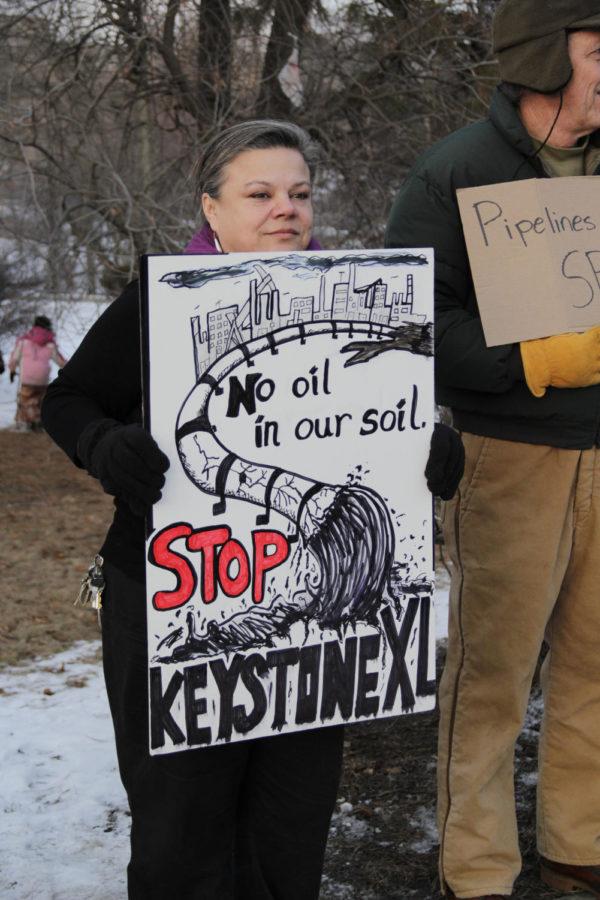Keystone XL Pipeline protestors urge Obama to veto project plan
Kelby Wingert/Iowa State Daily
ISU students and community members protested the Keystone XL pipeline on the corner of Welch Avenue and Lincoln Way on Feb. 3, 2014. Around 30 people, including 11 students, stood in 27 degree weather for about an hour in protest of the pipeline expansion.
February 3, 2014
Students from Iowa State and Ames community members joined together Monday to protest the Keystone XL Pipeline project.
Across the country, groups gathered to tell President Obama why they think he should veto the pipeline.
A vigil of around 30 people, including 11 ISU students, assembled at the corner of Lincoln Way and Welch Ave. in the 27 degree weather to join the nationwide campaign arranged by the organization 350.org.
The group gathered in response to the State Department’s release of the Final Supplemental Environmental Impact Statement on Friday, which started the countdown to Obama’s final decision on the pipeline.
“It’s a big evaluation of the Keystone XL Pipeline saying what the environmental impacts are, what the economic benefits are,” said Rivka FidelCQ, ActivUs president and graduate student in agronomy at Iowa State. “It’s basically a big cost benefit analysis for the country.”
In the statement, Fidel said there is a portion saying the pipeline will increase greenhouse gas emissions. Section 4.14.4 of the report says the percent of greenhouse gas emissions would increase, but not substantially.
“Months ago, President Obama said if the pipeline increased greenhouse gas emissions, he would veto it,” Fidel said. “We wanted to make sure he holds up that promise. We’re all sending this message to Obama: do not approve the pipeline.”
The proposed 1,179 mile pipeline, projected to cost $5.3 billion, is equipped to transport 830,000 barrels of crude oil a day from Canada to the Gulf Coast as a project for “the energy security of the United States and for strengthening the American economy,” as stated on the pipeline’s website.
The website also says the pipeline will have minimal impact on the environment, will create thousands of jobs and will decrease the United States’ dependency on foreign oil.
Passing cars honked in support and a few pedestrians stopped to join the protestors to say otherwise.
Shane Blair, junior in chemistry, was walking by the protest and after discovering the cause, grabbed a sign and joined in.
“I support the movement because of [the pipeline’s]…environmental impact,” Blair said.
Protestors around the nation say the pipeline increases the risk of a pipe burst, which would result in an oil spill. Environmentalists are also concerned about water waste and fracking.
Fracking is the process of drilling and injecting fluid into shale rocks at a high pressure in order to release the natural gas inside.
The oil in Alberta, Canada, is being extracted from tar sands, one of the dirtiest forms of fossil fuels.
“The amount of energy it takes to extract and process tar sand oil is horrendously high. It’s so dirty,” said Ames resident Mark Harris.
Deborah Bunka, a Canadian native who moved to Ames in 1997, said she grew up near tar sands and saw the environmental effects.
“I’m Canadian and I find it embarrassing,” Bunka said. “That’s why I’m here today. We’ve seen the effects of fracking…I truly believe this is an environmental risk and this earth has no life boat. Once we screw this place up, we’re done.”
The project is said to provide approximately 9,000 construction jobs and 7,000 jobs in manufacturing.
Fidel, who has been doing research on the subject, said there would be 10 times more jobs provided by repairing and maintaining old pipelines rather than making this new one.
Fridel said the next step for ActivUs will hopefully be to bring a group of students to protest in early March to Washington D.C., depending on funding.
Fidel said ActivUs is primarily focused on making the ISU campus more sustainable, but since the Keystone Pipeline is such a large national issue, she felt the need to get involved.
“Any climate issue is a big concern,” said Bailey Nash, freshman in geology. “I think it’s awesome that Ames is doing something about it and I wanted to be a part of it.”

















